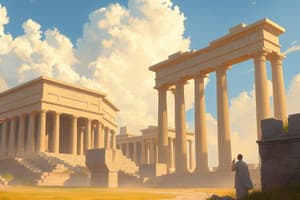Podcast
Questions and Answers
Who were Romulus and Remus in relation to the founding of Rome?
Who were Romulus and Remus in relation to the founding of Rome?
- Conquerors from a neighboring city
- Noble cousins from a powerful Roman family
- Twin brothers raised by a she-wolf (correct)
- Priests who established the first Roman temple
What led to the establishment of the Roman Kingdom?
What led to the establishment of the Roman Kingdom?
- A civil war between noble families
- A successful rebellion against the Etruscans
- The victory of Romulus in a struggle with Remus (correct)
- An invasion by neighboring tribes
What marked the beginning of the Roman Republic?
What marked the beginning of the Roman Republic?
- The assassination of the last Roman king
- The signing of a peace treaty with neighboring city-states
- The invasion of Rome by barbarian tribes
- The overthrow of Tarquinius the Proud (correct)
- A popular uprising against the ruling king
Which social class dominated the Roman Senate?
Which social class dominated the Roman Senate?
What was the role of the People's Assembly in the Roman government?
What was the role of the People's Assembly in the Roman government?
What was the main role of the plebeians in Roman society?
What was the main role of the plebeians in Roman society?
Which language spoken by the Romans later evolved into modern Romance languages?
Which language spoken by the Romans later evolved into modern Romance languages?
What was the main emphasis of Roman religion on the Roman Pantheon?
What was the main emphasis of Roman religion on the Roman Pantheon?
Which aspect served as the backbone of the Roman economy?
Which aspect served as the backbone of the Roman economy?
What was the primary function of a Roman legion?
What was the primary function of a Roman legion?
Flashcards are hidden until you start studying
Study Notes
Ancient Rome is one of the most studied societies in history, with its influence extending far beyond Europe into the modern world. Spanning over a thousand years from the founding of the city by Romulus and Remus, around 753 BC, to the fall of the Western Roman Empire in 476 AD, it was a period marked by impressive achievements in law, politics, art, architecture, engineering, philosophy, religion, science, and more. This article will delve into various aspects of ancient Rome, including its early beginnings, political and social structure, culture, religion, economy, military, and legacy.
Early Rome (753-509 BC)
Founding and Early Kings
Rome was traditionally founded by Romulus and Remus, twin brothers raised by a she-wolf. The two brothers fought for control of the city, leading to Romulus's victory and the establishment of the Roman Kingdom.
Early Roman Republic (509-27 BC)
The Roman Republic began in 509 BC when the last king, Tarquinius the Proud, was overthrown. The new government was a mix of an elected assembly and a senate made up of former magistrates.
Political and Social Structure
The Senate
The Roman Senate, formed in 494 BC, was the supreme body of the Republic. It was composed of the city's most powerful men, known as patricians, who made up the upper class of Roman society. The Senate had the power to declare war, make peace, and settle disputes.
The People's Assembly
The People's Assembly, or comitia, was the other half of the Roman government. It was made up of the plebeians, the lower class of Roman society, and could elect the consuls, who held executive power.
Social Classes
In ancient Rome, society was divided into three main classes: patricians, plebeians, and slaves. Patricians were members of the Senate and held the highest social status. Plebeians were commoners who could vote in the assembly and held the middle social status. Slaves were the lowest class and had no legal rights.
Culture
Language
The Romans spoke Latin, which later evolved into the Romance languages (e.g., Italian, Spanish, French, Portuguese, and Romanian).
Art and Architecture
Roman art and architecture were highly influential. Some of the most significant Roman structures include the Colosseum, the Pantheon, and the aqueducts.
Religion
Roman Pantheon
The Roman pantheon was a collection of gods and goddesses who were worshipped by the ancient Romans. These deities were responsible for various aspects of life, such as agriculture, love, war, and more.
Economy
Agriculture
Agriculture was the backbone of the Roman economy, with the majority of the population being farmers.
Trade
Rome was a major trading power, with goods coming from as far away as India and China.
Military
Legions
The Roman legions were the backbone of the Roman military, with each legion consisting of around 5,000 soldiers.
Conclusion
Ancient Rome was a civilization that left an indelible mark on the world. Its achievements in art, architecture, law, politics, and more continue to influence our lives today. Despite its flaws, such as the exploitation of slaves and the subjugation of other peoples, it remains a fascinating period of history worth studying.
Studying That Suits You
Use AI to generate personalized quizzes and flashcards to suit your learning preferences.




